
Summer Reading 2025
Read along with Duke faculty
Explore these thought-provoking works of Duke experts from a variety of disciplines and genres. Make a selection to share with your book club, and spark intellectual dialogue with questions provided by the authors themselves.
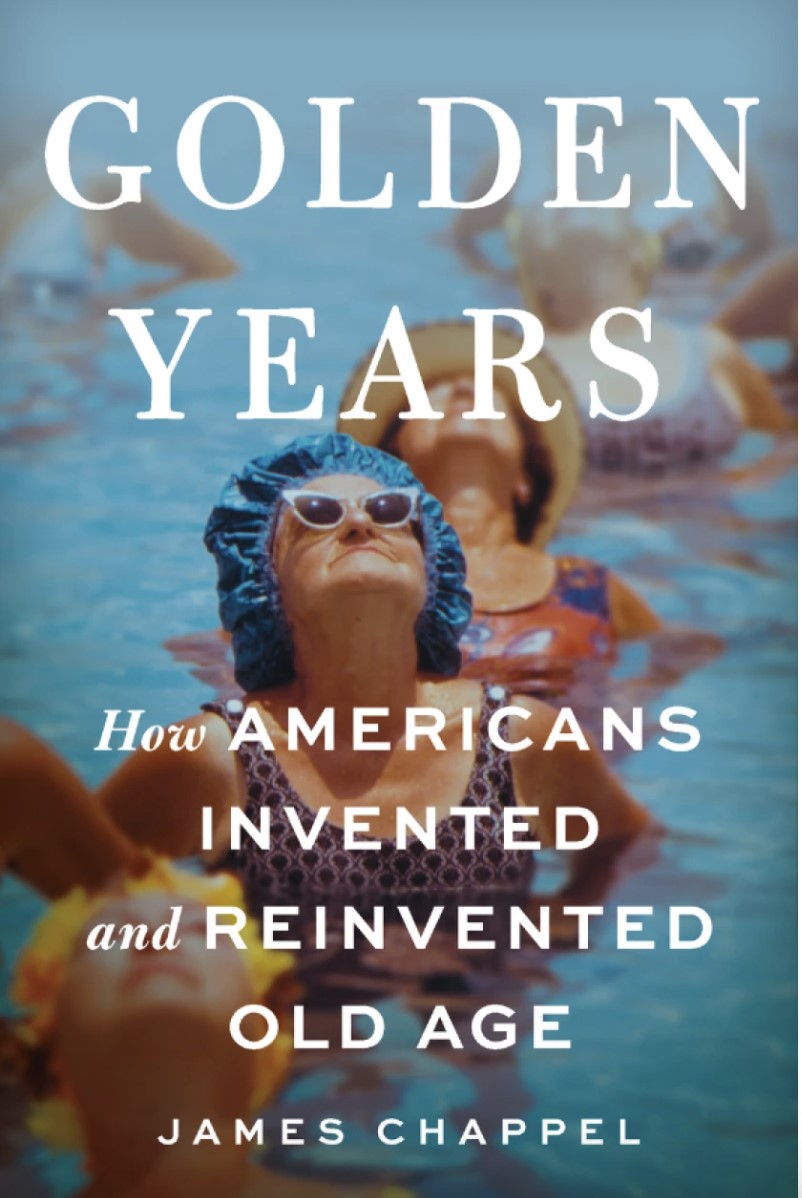
Golden Years: How Americans Invented and Reinvented Old Age
In Golden Years, historian James Chappel shows how old age first emerged as a distinct stage of life and how it evolved over the last century, shaped by politicians’ choices, activists’ demands, medical advancements, and cultural models from utopian novels to The Golden Girls.
5 questions to consider while reading
1. Aging is different for everyone! What parts of the story told in the book made sense for your own life, and which parts didn't?
2. What do you know about the way your parents or grandparents aged? How does it compare to your own experience?
3. The book argues that the popular image of older people has improved a lot in the past few decades. Does that feel true to you? What has been your experience?
4. Which images of aging on TV, movies, or social media have been most impactful for you? Are they mainly positive or negative?
5. Why do you think the American political system is so unwilling to address the reform of Social Security, which is necessary for the program's survival?
Biography
James Chappel is the Gilhuly Family Associate Professor of History at Duke University and a senior fellow at the Duke Aging Center. The author of Catholic Modern, his writing has appeared in the New York Times, the Nation, and the New Republic. He lives in Durham, North Carolina.
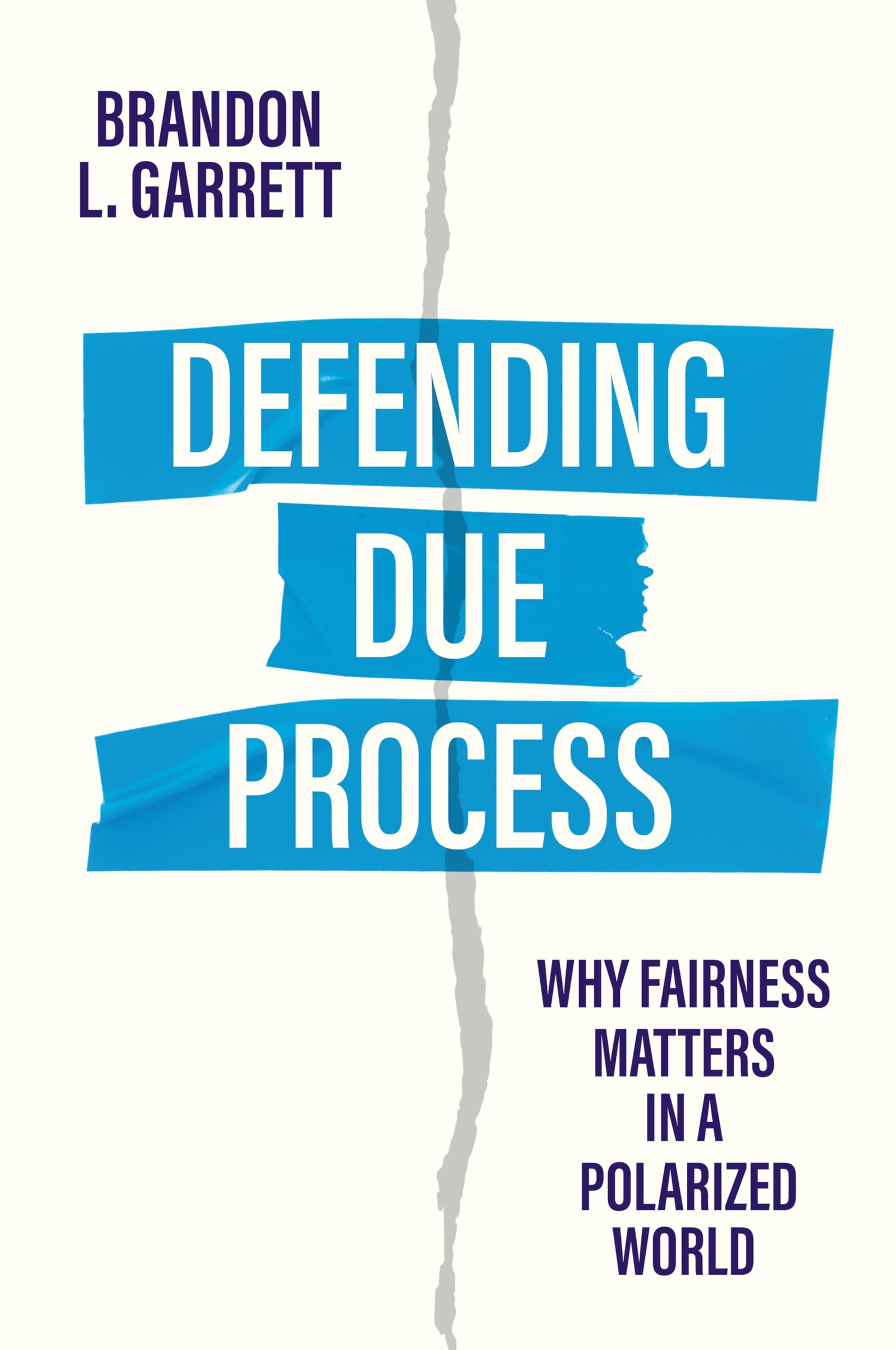
Defending Due Process: Why Fairness Matters in a Polarized World
Why is due process under so much pressure? Brandon Garrett exposes widening fault lines. Common ground matters now more than ever to mend political polarization, cool simmering distrust of government, prevent injudicious errors, and safeguard constitutional rights. A revival of due process is long overdue.
5 questions to consider while reading
1. Where have you heard about due process issues in the news recently? Why do you think that due process rights matter today?
2. What did you think of the case of Chianne discussed in the introduction? Do you think her family was treated fairly? What process do you think they should have received?
3. How would you answer the question that I discuss in Chapter 2: Which of the following errors at trial do you believe causes more harm to society? • erroneously convicting an innocent person • failing to convict a guilty person Or, do you believe these errors to be equally bad? Why would you answer it that way? And did other people’s answers, described in the book, surprise you?
4. Are you concerned about artificial intelligence and other types of new technology? How do you think that they will affect our due process rights?
5. What can judges, lawmakers, and all of us do to better protect our due process rights?
Biography
Brandon L. Garrett is the L. Neil Williams Professor of Law at Duke University School of Law, where he has taught since 2018. Garrett is the founder and faculty director of the Wilson Center for Science and Justice at Duke. He was previously the Justice Thurgood Marshall Distinguished Professor of Law and White Burkett Miller Professor of Law and Public Affairs at the University of Virginia School of Law. His research and teaching interests include criminal procedure, wrongful convictions, habeas corpus, corporate crime, scientific evidence, civil rights, and constitutional law. Garrett’s work includes seven books, most recently “Defending Due Process: Why Fairness Matters in a Polarized World.” In addition to numerous articles published in leading law reviews and scientific journals, Garrett's work has been widely cited by courts, including the U.S. Supreme Court, lower federal courts, state supreme courts, and courts in other countries.
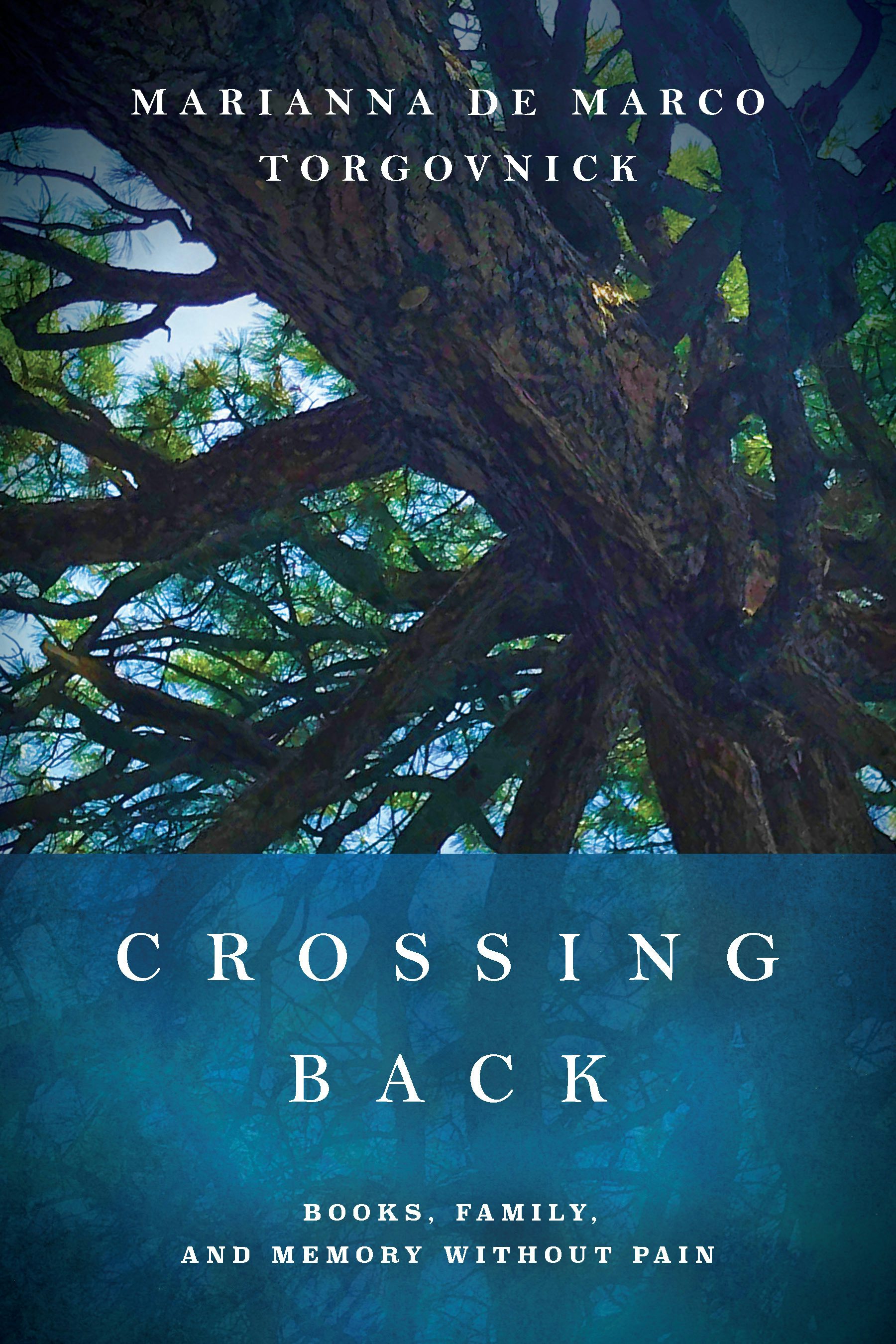
Crossing Back: Books, Family, and Memory without Pain
A warm and intimate user’s guide to books, family, and memory in the mourning process, the end-point being memory without pain, Crossing Back is a wide-ranging memoir about growing older and learning to ride the waves of change. Lively and conversational, Torgovnick is masterful at tracking the moment-to moment, day-to-day challenges of sudden or protracted grief and the ways in which the mind and the body seem to search for—and sometimes find—solutions.
5 questions to consider while reading
1. Do the experiences in CROSSING BACK connect with yours? Was it the parent-child relationship? The experience of death? The desire to go back home? What are some key memories of your own?
2. Is there a book or books that have been especially meaningful to you? If so, how? Were they classics?
3. Rituals share common properties: lineage, regular steps, the ability to calm the mind. Do you have that kind of activity? If so, what is it? If not, would you be interested in trying?
4. As fellow lovers of Duke, the chapter called "What Really Happened at Duke" may have special interest. Does the situation there have any resonance in your life? What was Duke like when you attended?
5. What does "home" mean to you? The place you grew up? Where you live now? Every place you have ever lived? All of none of these? How did you feel about the chapter called "Real Estate / Unreal Estate"?
Biography
Marianna Torgovnick was born in Bensonhurst, Brooklyn and got her doctorate at Columbia University. She taught at Williams College before coming to Duke. She has been a Guggenheim Fellow, a Fulbright lecturer, and taught at Princeton U for a semester and at DKU the year it opened. She has written two acclaimed books on primitivism, the fascination with "exotic" or tribal cultures, called GONE PRIMITIVE and PRIMITIVE PASSIONS. CROSSING BACK continues the story told in her first memoir, CROSSING OCEAN PARKWAY, which won an American Book Award. Marianna has two daughters, one husband, and loves to travel in New Mexico, California, and Europe, where she feels lucky to have taught Duke in Venice several times.
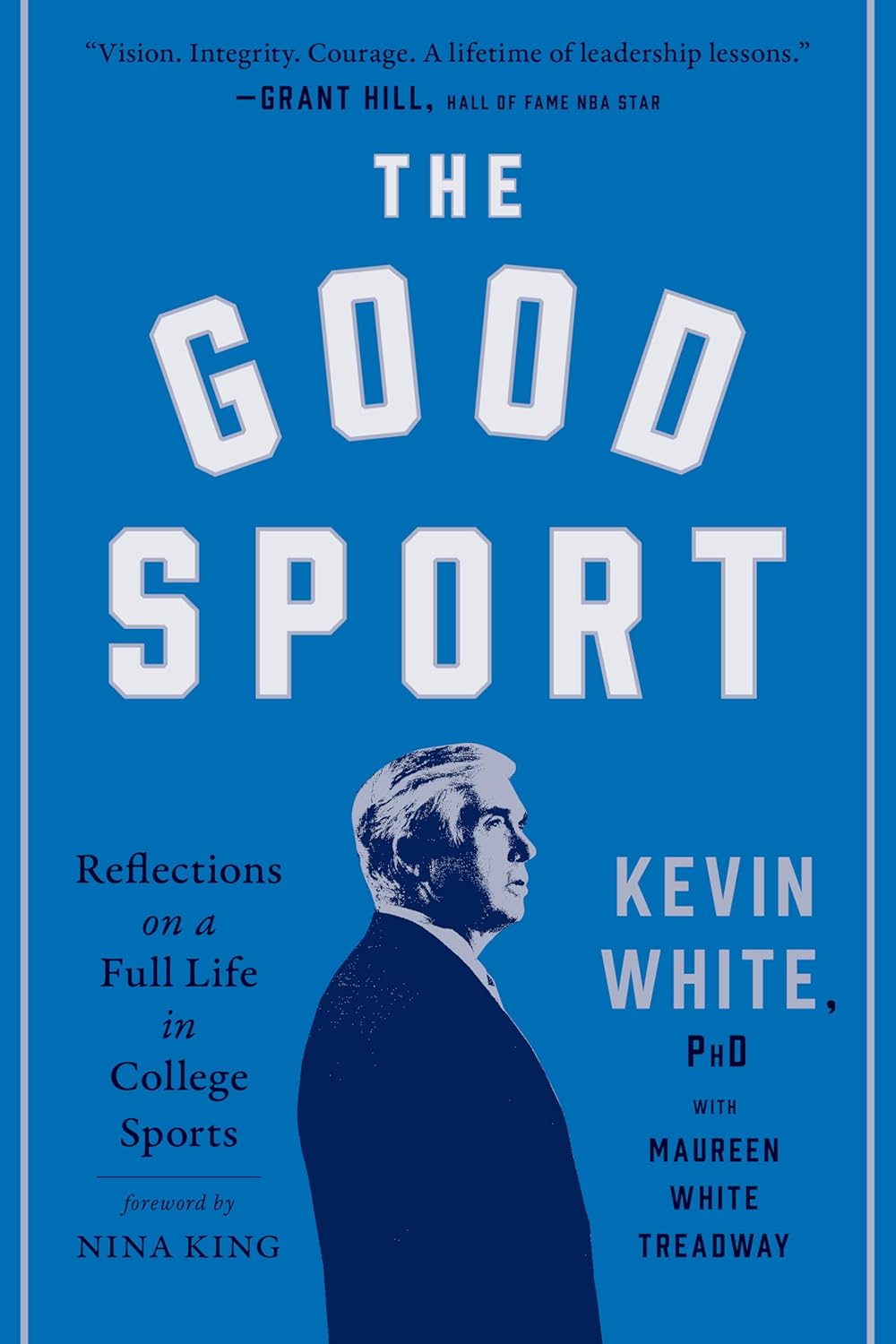
The Good Sport: Reflections on a Full Life in College Sports
Kevin White's new memoir, “The Good Sport: Reflections on a Full Life in College Sports,” takes readers on a journey from his Irish-Catholic youth to electrifying locker rooms and high-pressure boardrooms. Drawing on his long, distinguished career leading athletic programs at major universities, White examines the current chaos, challenges and opportunities facing intercollegiate sports.
5 questions to consider while reading
1. How did Kevin White’s Irish Catholic culture and upbringing shape his leadership philosophy and career in college athletics? And how might your own family background inform the ways in which you navigate your career?
2. What are the ethical responsibilities of college athletic administrators in balancing education and commercialization? Drawing from White’s concerns about NIL, the transfer portal, and student-athlete welfare, how should leaders navigate the tension between institutional revenue and student development?
3. What role should college athletics play in supporting DEI (diversity, equity, and inclusion) within higher education? White highlights a lifelong commitment to DEI rooted in personal and ancestral experiences. How can athletic departments institutionalize these values effectively?
4. In what ways has the current state of college sports strayed from its original mission, and can it be realigned? Using White’s critique of the NIL era and “pay-for-play” dynamics, discuss whether a return to core educational principles is realistic or idealistic.
5. What lessons can emerging athletic directors learn from White’s career about institutional leadership and navigating politics in higher education? Reflect on specific moments from his tenures at places like Notre Dame and Duke. How did he balance vision, relationships, and institutional pressures?
Biography
Dr. White presently serves as a professor of business administration at Duke University's Fuqua School of Business and senior adviser with Huron Consulting Group. The Good Sport draws on Dr. White’s 50-year career as a NCAA Division I coach, AD/VP for athletics and university professor. He has provided transformational leadership at some of the country's most recognizable universities, including Notre Dame and Duke. He has also served on the NCAA Council, NACDA Board of Directors, and United States Olympic/Paralympic Committee Board of Directors. Dr. White is widely recognized as one of the nation's most influential college sports leaders; most recently, he is the recipient of the NACDA Corbett Award as of June 9, 2025. The Good Sport features numerous lessons learned and illuminates his expertise regarding the industry’s best practices. Dr. White’s insights and vision come amid the most dynamic period in the history of college sports, while the future of the NCAA remains uncertain.
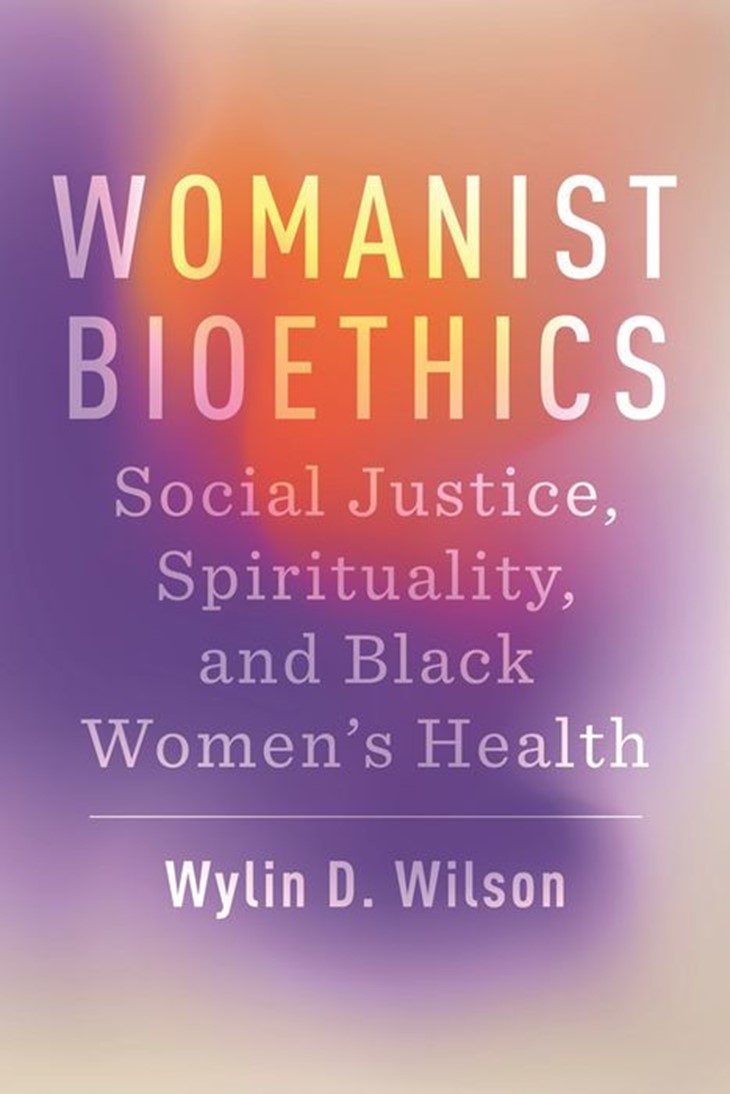
Womanist Bioethics: Social Justice, Spirituality, and Black Women's Health
Womanist Bioethics develops the first specifically womanist form of bioethics, focused on the diverse vulnerabilities and multiple oppressions that women of color face. This innovative womanist bioethics is grounded in the Black Christian prophetic tradition, based on the ideas that God does not condone oppression and that it is imperative to defend those who are vulnerable.
Because healthcare disproportionately fails Black people, and Black women especially, Wilson argues for a new bioethical framework to address the crisis—centering Black women’s experiences and voices in bioethics discourse and practice.
5 questions to consider while reading
1. How does Black women’s experience testify to the current state of the healthcare system in America?
2. What does Black women’s experience of engaging social institutions (such as healthcare) from the underside signify for women broadly in America?
3. What is the form that prioritization (and deprioritization) takes within public health, bioethics, and healthcare as a result of the racialized history of America?
4. Why is womanism necessary in helping the field of bioethics expand its narrative?
5. Why is the question of "what kind of person do I want to be" and virtue ethics central to addressing health disparities in the U.S.?
Biography
Dr. Wylin D. Wilson is Associate Professor of Theological Ethics at Duke Divinity School. She is former Teaching Faculty at Harvard Medical School Center for Bioethics, former Senior Fellow at the Harvard Divinity School Center for the Study of World Religions and was Visiting Lecturer in Harvard Divinity School Women’s Studies in Religion Program. She was also Associate Director of Education for the Tuskegee University National Center for Bioethics and formerly on faculty of Tuskegee University College of Agriculture, Environment and Nutrition Sciences. She is Principal Investigator for "Bioethics and Black Church: Addressing Racial Inequalities and Black Women’s Health in North Carolina". Her latest book is Womanist Bioethics: Social Justice, Spirituality and Black Women’s Health (New York: New York University Press, 2025). She has a Ph.D. in Religion from Emory University; M.S. in Agricultural, Resource, and Managerial Economics from Cornell University; and M.Div. from the ITC.
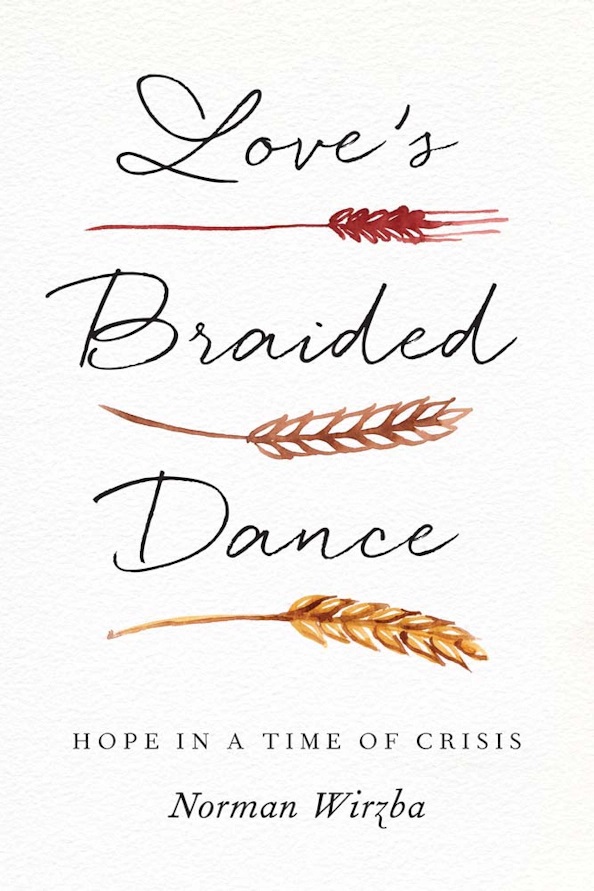
Love's Braided Dance: Hope in a Time of Crisis
In this series of meditations, Norman Wirzba recasts hope not as something people have, like a vaccine to prevent pain and trouble, but as something people do. Hope evaporates in conditions of abandonment and abuse. It grows in contexts of nurture and belonging. Hope ignites when people join in what Wendell Berry calls “love’s braided dance”—a commitment to care for one another and our world.
A moving exploration of the transformative power of hope in today’s world, and how the healing of communities, landscapes and people are central elements to a hopeful life.
5 questions to consider while reading
1. What's the difference between hope and optimism?
2. What are distinguishing features of hopeful people you know?
3. Why is love essential to a hopeful life?
4. Who or what or where inspires your hope?
5. What obstacles must we overcome to live a hopeful life?
Biography
Raised on a farm in southern Alberta, Wirzba went on to study history, theology, and philosophy, all with the aim of trying to understand how people can live on this earth and with each other in ways that nurture their goodness and celebrate their beauty. He is the author of multiple books, most recently "Loves Braided Dance," "This Sacred Life: Humanity's Place in a Wounded World," and "Agrarian Spirit: Cultivating Faith, Community, and the Land." He lectures frequently across North America and Europe. He also loves to bake, play guitar, and make things with wood. The father of four kids and the grandfather of two grandchildren, Wirzba loves spending time with family friends exploring the beauties of this world. He used to be a good athlete.

Time and Beauty: Why Time Flies and Beauty Never Dies
Time and beauty are two of our most visceral perceptions. Yet, their nature is seldom questioned. In this ground-breaking new work, Adrian Bejan — a true 'original' among physicists — explains, in a scholarly yet colorful style, the scientific basis for the perception of time and beauty.
In this playful yet deep new book, Bejan uses physics to explain why the pace of time seems to vary, why the golden ratio is so ubiquitous, and why beauty is so infused in human societies.
5 questions to consider while reading
1. Is the human perception of "time" continuous or discrete (a sequence of snapshots)?
2. Is "time" a property of nature (an 'inventory', like mass, energy, space/area/volume, etc) or the human perception of change with direction (objective) in the perceived image?
3. Why do we prefer objects and images shaped like the business card, cinema screen, facades of buildings, and flags of nations?
4. Why is it useful to humans and animals to perceive their immediate surroundings FASTER ?
5. Why do we feel that time accelerates as we age? What can we change in our daily movement (life) to slow down the passing of time?
Biography
Adrian Bejan received the Benjamin Franklin Medal from the Franklin Institute in Philadelphia. He is a Nautilus Books Award winner for “Time and Beauty.” The French Republic named him Knight of the French Order of Academic Palms. In 2024 he received The ASME Medal, the highest honor from the American Society of Mechanical Engineers, for “Eminently distinguished engineering achievement. Bejan is widely recognized for unprecedented creativity, breadth, and permanent impact on engineering; for developments in the new science of energy, motion, form, and evolution; and for building bridges to design in biological, geophysical, and sociological systems.” His influential work has earned him 18 honorary doctorates from 11 countries. He is among the top 0.01% of most cited and impactful scientists, the 6th in mechanical engineering worldwide, and the 11th across all engineering disciplines. Adrian Bejan earned his B.S., M.S., and Ph.D. degrees at the Massachusetts Institute of Technology.
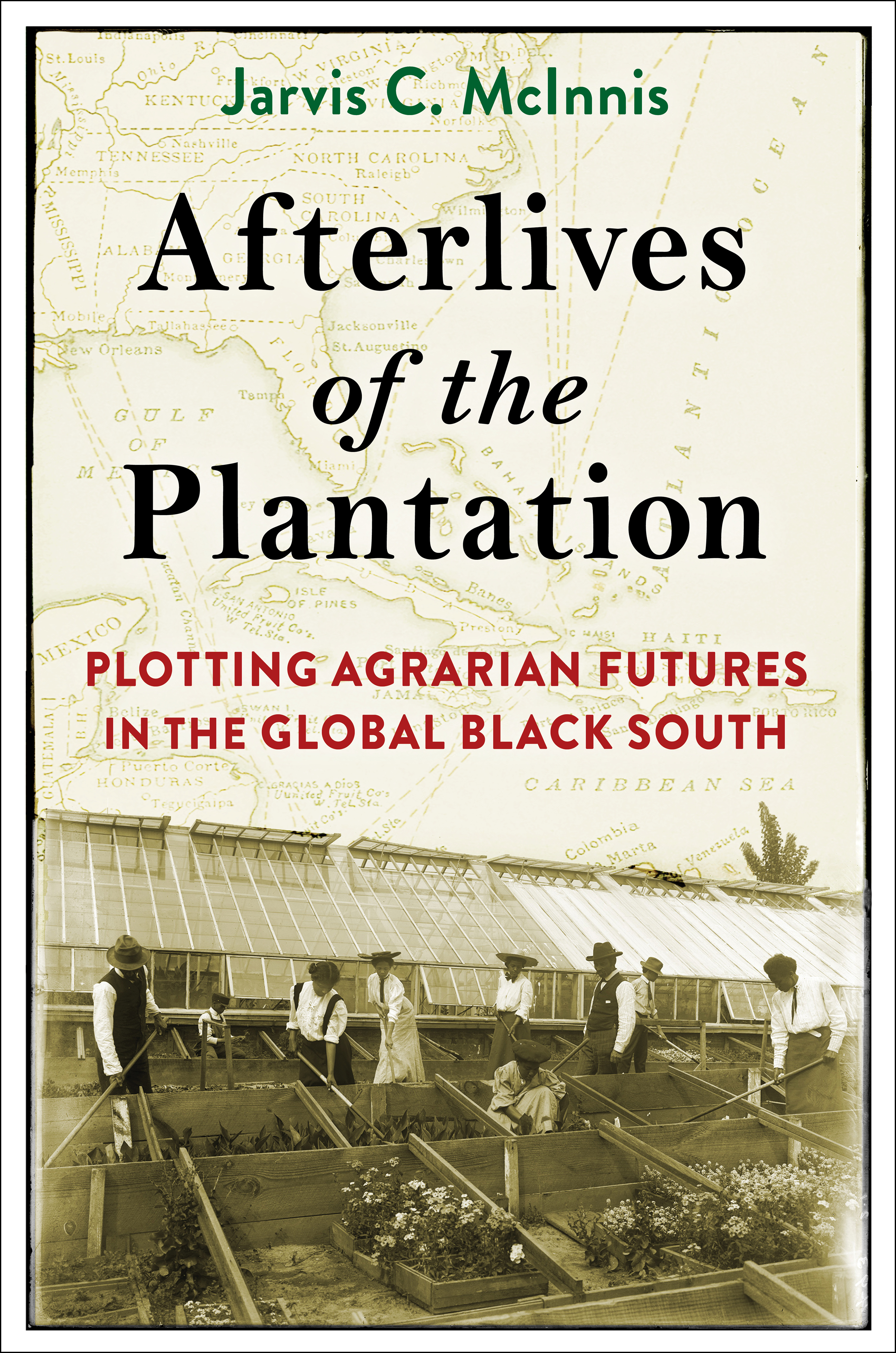
Afterlives of the Plantation: Plotting Agrarian Futures in the Global Black South
In contrast to traditional understandings of Black modernity as urban and premised on northward migration, Jarvis C. McInnis foregrounds rural settings and practices of place making, rootedness, and liberatory agriculture. Shedding new light on the transnational influence of a historically Black institution in the U.S. South, Afterlives of the Plantation remaps Black cultural, intellectual, and political histories down to the very soil.
This book tells a new, underexplored story of how formerly enslaved peoples and their descendants attempted to transform plantations into viable independent farms, colonies, schools and cooperatives.
5 questions to consider while reading
1. Throughout Afterlives of the Plantation, I emphasize the importance of Tuskegee’s vision of sustainable and regenerative farming in the aftermath of the abusive, large-scale, and monocrop agricultural practices of the slave plantation. As we confront climate change and other forms of ecological catastrophe today, what lessons can we glean from Tuskegee about becoming better stewards of the earth?
2. What are some other ways the plantation and its practices and logics of human exploitation and ecological extraction persist today? Relatedly, what are some plot logics and ethics that we can use to either repurpose the plantation toward a more just and liberatory future or dismantle it altogether?
3. One of the challenges of racial uplift across the Global Black South was the tension between care and paternalism among the Black elite. Although elite Black people desired to help improve the lives of their working-class counterparts, they sometimes held condescending attitudes toward the Black masses and did not always regard them as co-curators of their own futures. What can we learn from this example about more ethical ways to help those who may be less fortunate? Is there a way to empower and show care for others who do not share our privilege, while respecting them as equals and taking seriously their right to self-determination?
4. Claude McKay honored the experiential knowledge of Black farmers in Jamaica, regarding them as intellectuals of the land. Who are some people in your life who may not be formally educated, but have a wealth of knowledge about their respective industries or areas of expertise? How does this invite you to think differently about the relationship between formal and informal education?
5. Zora Neale Hurston worked to validate Black vernacular culture as dynamic, innovative, sophisticated, and worthy of preservation. In doing so, she challenged the false dichotomy between high and low culture that structures the Western artistic canon. How might Hurston’s approach—her insistence that difference does not connote deficiency—help us to rethink and perhaps disrupt other social and cultural hierarchies that structure our world?
Biography
Jarvis C. McInnis is an Associate Professor of English at Duke University. He is a proud summa cum laude graduate of Tougaloo College in Tougaloo, Mississippi, where he earned a BA in English, and Columbia University in the City of New York, where he earned a Ph.D. in English & Comparative Literature. McInnis is an interdisciplinary scholar of African American & African Diaspora literature and culture with teaching and research interests in the Global South, Black geographies and ecologies, sound studies, visual culture, and the archive. His first book-length monograph, Afterlives of the Plantation: Plotting Agrarian Futures in the Global Black South, charts an alternative cultural and intellectual genealogy of Black modernity by centering Booker T. Washington’s school, the Tuskegee Institute, as a crucible of black transnational and diasporic relations between southern African American and Caribbean writers, intellectuals, and cultures in the early twentieth century.
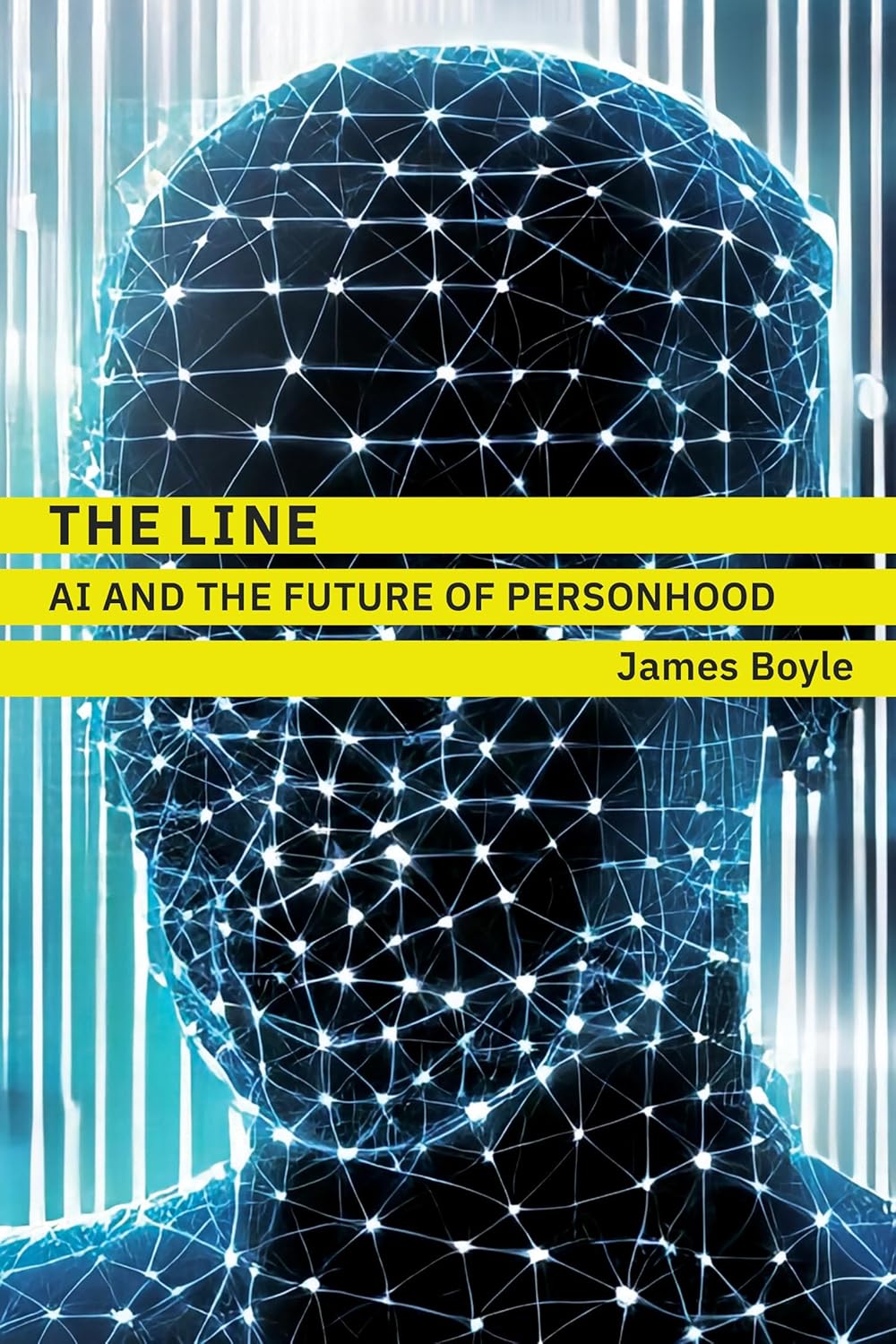
The Line: AI and the Future of Personhood
Chatbots like ChatGPT have challenged human exceptionalism: we are no longer the only beings capable of generating language and ideas fluently. But is ChatGPT conscious? Or is it merely engaging in sophisticated mimicry? And what happens in the future if the claims to consciousness are more credible? In The Line, James Boyle explores what these changes might do to our concept of personhood, to “the line” we believe separates our species from the rest of the world but that also separates “persons” with legal rights from objects.
Is AI on its way to gaining legal rights? How do we as a society draw “the line” that distinguishes persons from machines? Boyle's thought-provoking book explores how our ideas of personhood are changing.
5 questions to consider while reading
1. Humans have two demonstrated tendencies when confronted with something or someone unfamiliar. First, rejection: you aren't in our club and therefore deserve no respect and have no moral worth. Second, the kind of anthropomorphism some of us show with Siri, Chat GPT and even Roomba, projecting intellect and consciousness into things we should know are not conscious. Which tendency is most likely to predominate in our encounters with AI?
2. The theory of evolution forced people in the Victorian-era radically to reassess the place that they and their species had in the world. The book argues that AI could prompt a similar reconsideration, particularly AI that possesses qualities formerly thought to be reserved for humans, for example complex language. Sentences no longer imply sentience. Were you convinced? Why or why not?
3. One route for AI personhood would be the moral claim: Data from Star Trek tells us that it is a machine but is nevertheless conscious and deserving of moral respect. But there is a second path. We already have artificial persons. They are called corporations -- they get personality and legal recognition as a matter of mere convenience and efficiency. The book argues that both these routes will play a role in the AI debate. The next frontier of civil rights or Citizens United on steroids. Which do you think will predominate?
4. What did the discussion of sci fi, “Do Androids Dream of Electric Sheep?” and “Blade Runner” do to change your mind about AI (if anything)? Why do you think the book spends so much time on art, history, and literature?
5. The book is available for free download here. https://tinyurl.com/2s5u6j3k Why might an author rationally choose to do that?
Biography
James Boyle is William Neal Reynolds Professor of Law at Duke, the founder of The Center for the Study of the Public Domain, and a former Chair of Creative Commons. He won the Electronic Frontier Foundation's Pioneer Award for his work on Digital Civil Liberties. His most recent book is The Line: AI & The Future of Personhood (MIT 2024). Further details https://www.thepublicdomain.org/bio/

The Fine Art of Persuasion: Corporate Advertising Design, Nation, and Empire in Modern Japan
Using a multilayered analysis of the rhetorical intentions of design projects and the context of their production, implementation, and consumption, Weisenfeld offers an interdisciplinary framework that illuminates the importance of Japanese advertising design within twentieth-century global visual culture.
A deeply researched landmark examination of the evolution of Japanese advertising graphic design from the early 1900s through 1964, as well as a look at the role branding and advertising played in constructing Japan’s national identity.
5 questions to consider while reading
1. What do we learn about society from advertising?
2. What is the relationship between publicity and propaganda, and how might this still be relevant today?
3. What product or company discussed do you find the most interesting? Why?
4. Pick an image in the book that you find interesting and discuss how it sells a product, a brand, and a lifestyle?
5. How and why did Japan use the Olympics to project its national image? Do you think the Olympics still serve this purpose today?
Biography
Gennifer Weisenfeld is Walter H. Annenberg Distinguished Professor of Art and Art History in the Department of Art, Art History, and Visual Studies at Duke University. Her field of research is modern and contemporary Japanese art history, design, and visual culture. She has published four books: Mavo: Japanese Artists and the Avant-Garde, 1905-1931 (University of California Press, 2002); Imaging Disaster: Tokyo and the Visual Culture of Japan’s Great Earthquake of 1923 (University of California Press, 2012, Japanese edition Seidosha, 2014); Gas Mask Nation: Visualizing Civil Air Defense in Wartime Japan (University of Chicago Press, 2023), which was awarded the 2024 Prize for Outstanding Book by the Southeastern Conference of the Association for Asian Studies; and most recently, The Fine Art of Persuasion: Corporate Advertising Design, Nation, and Empire in Modern Japan (Duke University Press, 2025).